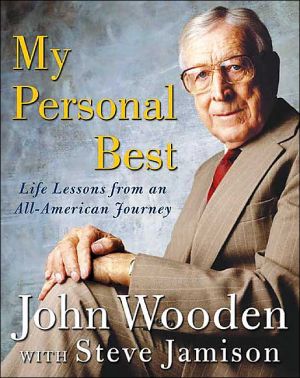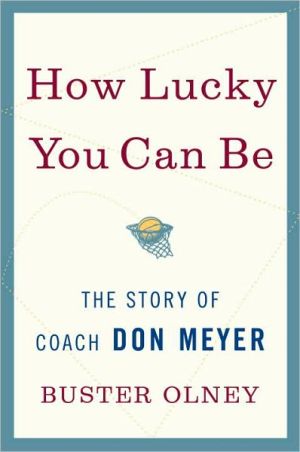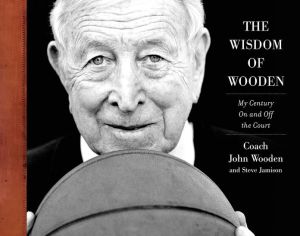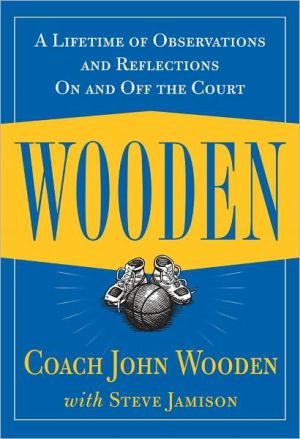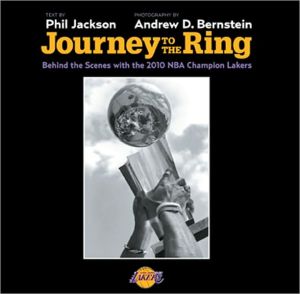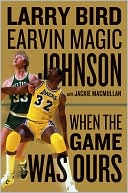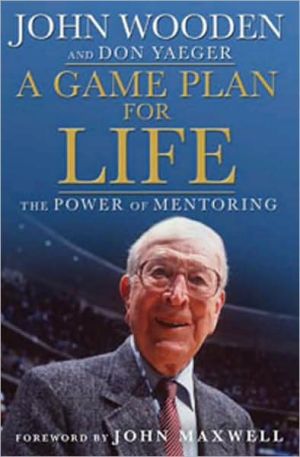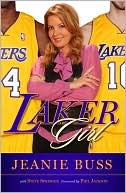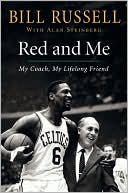My Personal Best: Life Lessons from an All-American Journey
NATIONAL BESTSELLER\ For John Wooden's millions of fans—a heartfelt and revealing self-portrait about the people and events that shaped his life\ Sports Illustrated declared: "There has never been a finer coach in American sports than John Wooden. Nor a finer man." ESPN selected him as the "Greatest Coach of the 20th Century." From his birth on an Indiana tenant farm, to All-American honors at Purdue, to his historic record-setting UCLA dynasty, John Wooden is a towering figure in...
Search in google:
Unforgettable life lessons from the man ESPN named its “Coach of the Century” “A good teacher or coach must not only understand others, but himself or herself as well.”—John WoodenIn this captivating book, beloved basketball coach John Wooden reveals the educational journey he took throughout his legendary life, from his earliest days on a small Indiana farm to the glory of his historic record-setting UCLA dynasty. Throughout My Personal Best, Coach Wooden introduces us to the men and women who shaped him and the many important life lessons they taught along the way.You’ll meet his father, Joshua, the honest, straight-shooting farmer who urged his son, “Don't try to be better than somebody else, but never cease trying to be the best you can be.” His mother, Roxie, a hardscrabble survivor who taught her children the value of faith and sacrifice. And his wife, Nellie, the high-school sweetheart (and ukulele virtuoso) who inspired him courtside through many games and who continued to be his inspiration throughout his life.You’ll also meet Coach’s own coaches, such as Principal Earl Warriner, the feisty disciplinarian who guided Wooden through his first games and left him with the lesson that “no player is bigger or better than the team.” High school coach Glenn Curtis, otherwise known as the Ol' Fox, who taught Wooden the poetry of basketball. And Purdue’s Piggy Lambert, whose unbending principles and love for his team became Wooden’s model of what a great coach and teacher could be.Last but not least you’ll meet many of the students and players who became, in the end, Coach’s greatest teachers of all.This treasure trove of all things Wooden also includes rare, never-before-seen photos from Coach’s private collection. Pairing these priceless photos with evocative personal stories, this modern sports classic encompasses the arc of Wooden’s achievements and the spirit of his All-American experience, one that will serve as inspiration to anyone who aspires to be a coach—not only on the court but in every arena of life."John Wooden is a living legend because he practiced what he preached—the code of ethics which created America's strength."—Phil Jackson, head coach, Los Angeles Lakers"Most of what I know, what's made me a smart man, has come from John Wooden."—Kareem Abdul-Jabbar, Naismith Basketball Hall of Famer"A man of John Wooden's accomplishments and integrity would stand out in any era, but now, almost three decades after he coached his last game, he is in some ways an even more striking figure."—Bob Costas"John Wooden is a 'philosopher-coach' in the truest sense: a man whose beliefs, teachings, and wisdom go far beyond sports and ultimately address how to bring out the very best in yourself and others in all areas of life."—Bill Walsh, three-time Super Bowl champion coach"John Wooden's teaching is timeless."--Bill Walton, Naismith Basketball Hall of Famer, NBC analyst“Whether it be on or off the court, John Wooden has been the personification of class and intellect as player, coach, and person for over seventy years. This book is a treasure.”—Howard Garfinkel, codirector, Five-Star Basketball Camp“There has never been a finer coach in American sports than John Wooden. Nor a finer man.”—Rick Reilly, Sports IllustratedJohn Wooden (1910-2010), guided the UCLA Bruins to ten NCAA basketball championships over a 12-year period, including four perfect seasons and an 88-game winning streak. He was named ESPN’s “Greatest Coach of the 20th Century” and voted “#1 Coach of All Time” by The Sporting News. Sports Illustrated said it best when they said: “There’s never been a finer man in American sports than John Wooden, or a finer coach.” In 2003 John Wooden was awarded the Presidential Medal of Freedom.Steve Jamison is America's foremost author and authority on the life and philosophy of John Wooden. Mr. Jamison is a consultant to the UCLA Anderson Scool of Business’ John Wooden Global Leadership Program. He has collaborated with Coach Wooden on an award-winning PBS presentation as well as several books, including his final book, The Wisdom of Wooden: My Century On and Off the Court.
Chapter \ 1 and 2 Excerpt\ 1\ Indiana \ Farm Boy: Lessons from Long Ago\ I \ was raised on oatmeal. My brothers--Maurice, Daniel, and Billy--and I had \ oatmeal for breakfast nearly every morning on our farm back in Centerton, \ Indiana. I raised my own children on oatmeal as well. Some things don't change; \ some lessons remain the same. Those my father taught many years ago may seem \ old-fashioned now, but like oatmeal, they still work. \ \ Joshua \ Hugh Wooden was a farmer--honest, hardworking, and fair. I never heard him speak \ an unkind word about another person, even on those occasions when he had every \ reason to. He came as close to living the Golden Rule as anyone I've ever known. \ Dad was strong enough to bend a thick iron bar with his bare hands, but he was \ also a very gentle man who read poetry to his four sons at night. He loved his \ family deeply. \ [insert \ photo 01-001]\ My father had a \ great appreciation for good books, knowledge, and education. Basketball? Enough \ to knock the bottom out of an old Van Camp tomato basket and nail it to the \ hayloft in the barn. Baseball was his favorite sport, unless you count checkers \ as a sport--which he did. At a time when \ Indiana was completely basketball crazy, Dad built a baseball diamond out behind \ the barn. Branch McCracken, a future Hall of Fame athlete and coach, and other \ local boys from around Centerton, Hazelwood, Martinsville, and Monrovia would \ come by on weekends to play ball and eat watermelon. \ But \ even baseball, in Dad's opinion, was just for play, a diversion. In his house \ there was a time for chores, a time for study, and then a time for play. Play \ came only when the first two had been completed.\ {A}A \ Hard Good Life\ Our \ farm was sixty-five Indiana acres of wheat, corn, alfalfa, timothy, and \ potatoes. A narrow dirt road cut through the fields and past our white farmhouse \ with its sparse living room and kitchen--a black potbelly stove in the former, a \ wood-burning stove for cooking in the latter. There were two small bedrooms for \ the six of us; my brothers and I slept two to a bed. Near our old barn was a \ smokehouse for curing meat, and next to that, a well where we pumped our water \ by hand. Over to the side, all by itself, was the outhouse--a three-holer. \ \ We had no \ electricity, plumbing or conveniences, and for entertainment Dad read books to \ us in the evening by the light of a coal-oil lamp. Sometimes we'd hear Lord \ Alfred Tennyson's Idylls of the \ King, Edgar Allan Poe's "The Raven," or even William \ Shakespeare. Before we were sent off to bed, he'd always include a verse or two \ from the Good Book. \ On bitter cold \ nights when the winter winds whistled across our fields, Dad would heat bricks \ on the potbelly stove and wrap them in towels. He'd place the bricks at the foot \ of our beds, under the thick quilts Mother had sewn, to keep us warm. \ \ {A}A \ True Compass\ Dad \ was the best man I ever knew, the one who set the course that guided me through \ life--what I believe, what I do, and how I do it. In so many ways he made \ everything happen. And he did it by teaching us in word and deed that the \ simplest virtues and values were the most important ones. \ Joshua Hugh \ Wooden died long before the University of California{-}Los Angeles (UCLA) won a \ men's college basketball championship. Do I wish he'd lived to see me coach a \ team to a national title? Yes, but it wouldn't have mattered so much to him. \ \ His priorities \ were different. Material things and public notice meant little. Education was \ important. Family was important. Outscoring someone in a basketball game, even \ for a national championship, had much less significance. Dad lived long enough \ to see me accomplish what was important to him. Nevertheless, he was responsible \ for the good things that happened to me as a coach. Therefore, it surprises \ people that I received hardly any basketball instruction from Dad--no tips on \ jump shots, free throws, or anything else. He seldom attended games and was only \ slightly interested in results. His concern and guidance were deeper. \ \ In those early \ days, Dad's message about basketball--and life--was this: "Johnny, don't try to \ be better than somebody else, but never cease trying to be the best you \ can be. You have control over that. The other you don't." It was simple advice: \ work hard, very hard, at those things I can control and don't lose sleep over \ the rest of it. His advice was easier said than done, but very good \ advice.\ "Don't \ try to be better than somebody else, but never cease trying to be the best \ you can be."\ --Joshua \ Wooden\ Then he would \ usually add, as he talked to us at the kitchen table, "Boys, always try to learn \ from others, because you'll never know a thing that you didn't learn from \ somebody else--even if it's what not to do." I believed him and \ took his advice to heart and later tried to teach the same message. \ \ At Dayton High \ School, South Bend Central High School, Indiana State Teachers College, and \ UCLA, those under my supervision knew I asked for an accountability above \ outscoring an opponent or getting a better grade than the person across the \ aisle. "Try your hardest. Make the effort. Do your best," I'd tell them. "The \ score cannot make you a loser when you do that; it cannot make you a winner if \ you do less." I still believe this.\ Some have \ suggested that one of the reasons UCLA often outscored opponents was that I \ never stressed outscoring opponents--that is, "beating" someone else or \ "needing" to win a game. I don't know if that's true or not. Try your hardest, \ make the effort, do your best. That's what I stressed, and it came from \ Dad.\ "Try \ your hardest. Make the effort. Do your best."\ Today, almost a \ century after he first taught that lesson to me, I believe his advice is still \ good as gold. I learned so much from my father, but that may be his strongest \ lesson. It's hard to say.\ {A}A \ Mother's Example\ Roxie \ Anna Wooden, my mother, lost her two young daughters--my sisters--early on. \ Diphtheria killed Cordelia before her third birthday. My youngest sister died \ before she even had a name. They were buried in the Centerton cemetery not far \ from our farm. Today my parents lie next to them.\ I doubt if Mother \ ever really recovered from the deaths of her two little girls. Perhaps she \ survived because farm life offered no time for self-pity. Maybe she survived \ because of her strength and her religion. Like my father, Mother placed her \ faith in the Good Lord, and they taught us to do the same.\ The food we ate \ we grew. Dad had about thirty hogs, four or five milk cows, lots of chickens, \ and some mules for field work--no tractor for plowing, no automobile for \ driving. Mother's garden was next to our farmhouse and was bigger than the \ house. Peas, carrots, tomatoes, squash, beans, celery, radishes, and \ strawberries were grown, eaten, or canned and stored down in the fruit cellar. \ She even canned beef and pork. Chicken was the only fresh meat we ate \ year-round, and Mother cooked it a hundred different ways. I liked it every way \ she made it, especially roast chicken. In fact, I still like roast chicken. \ \ Occasionally \ Dad would shoot squirrel, rabbit, or quail, which certainly added a little \ variety to our kitchen table.\ Mother baked our \ bread and Dad churned our butter. When the bread was hot out of the stove, we'd \ spread the butter on thick and cover it with homemade strawberry jam, or \ blackberry or raspberry. I loved the heels of the loaf, still warm and soft with \ plenty of sweet fresh butter. I still love the heels, even if the bread is from \ a store. And I miss Mother's persimmon pudding, peach cobblers, and homemade ice \ cream. \ She sewed most of \ our clothing. In fact, I don't remember her ever buying a new dress for herself. \ Only on rare occasion did she purchase new shoes. When she did, they had to last \ her a long time and so did ours.\ Joshua Hugh and \ Roxie Anna Wooden's lives were hard, but for my brothers and me, growing up on \ that little farm in Centerton was almost perfect. \ {A}Lessons \ in the Loss\ The \ end came suddenly. Bad feed killed the hogs, drought stunted the crops, and the \ bank took the farm. In those days there was no insurance for this kind of \ trouble, so we lost everything. Those were very hard times for our family, and \ the Great Depression hadn't even begun.\ Through it all, \ Dad never winced. He laid no blame on the merchant who had sold him the feed, \ didn't curse the weather, and had no hatred toward the banker. My father had \ done his best, but things went bad. "Blaming, cursing, hating doesn't help you," \ he'd say. "It hurts you." His example is deeply imbedded in my mind and, I hope, \ reflected in my behavior.\ He was a living \ model of his own "two sets of threes"--brief instructions that he felt were \ basic to decent behavior. My brothers and I heard his two sets of threes often \ while we were growing up--not as often as we ate oatmeal, but enough that we \ remembered them: "Never lie. Never cheat. Never steal," was his first set. \ "Don't whine. Don't complain. Don't make excuses," was the second set. He \ believed you should do your best, and if the results were unsatisfactory, keep \ quiet about it and work harder next time.\ Never \ lie.\ Never \ cheat.\ Never \ steal.\ Don't \ whine.\ Don't \ complain.\ Don't \ make excuses.\ As instructive as \ it was to hear him recite the two sets of threes, seeing him abide by them as he \ lost the farm had a most powerful effect on me. That's where I came to see that \ what you do is more important than what you say you'll do. People say they'll do \ all kinds of things.\ 2\ My First \ Coach: Principal Earl Warriner\ Centerton \ Grade School--a three-room schoolhouse--was a mile up the road from our farm. \ The principal was Mr. Earl Warriner, a disciplinarian who was strict, but fair. \ When he gave it to you, you had it coming. On those occasions he'd walk outside \ and cut a switch from the hedge, trim off its thorns with his silver \ pocketknife, and then let you have it across the backside a few times. It stung \ even though I always wore heavy denim overalls. \ \ Mr. \ Warriner was a feisty boxer, excellent athlete, and spirited competitor. He was \ also well-liked and respected, and a veteran of World War I. At the time, I \ didn't know what a mentor was, but he became one for me, a positive and guiding \ influence throughout my life.\ \ When I was \ eleven, my father gave me permission to play on the Centerton basketball team \ under Mr. Warriner's supervision. The team had eight or nine boys, depending on \ the day and how the fall harvest was coming along. We played on a dirt court \ next to the schoolhouse and had to rake off branches, leaves, and sticks before \ a game. In the late fall, sometimes it would start snowing while we were \ playing, but we would keep right on going. \ Our basketball \ had a heavy cover of thick brown leather and was about the same size as today's \ ball--only it wouldn't stay that size. As it gradually lost air, we'd unlace it \ and use a shoe horn to pry the bladder's air tube out, put it between our lips \ and blow hard, tie a rubber band around the tube, and knead it back under the \ cover laces. Unfortunately, it got out-of-round easily, picked up dirt quickly, \ and became heavier as the game wore on. Later, as an All-American at Purdue \ University, I received considerable attention for my dribbling skills. Learning \ with a lopsided basketball on a dirt court with potholes and patches of snow may \ have been why I became a pretty fair dribbler.\ \ {A}Education Before Sports\ As a \ teacher, coach, principal, and athlete, Mr. Warriner felt that while sports \ could be worthwhile, true education was obtained only in the classroom. \ Therefore, he allowed no boy to practice or play without specific permission \ from teachers. Schoolwork had to be completed and classes attended. Only then \ would he give you the privilege of walking on his dirt court to play basketball. \ Later, when I was coaching, my emphasis on academics reflected Mr. Warriner's \ own priorities (as well as Dad's). There's a reason student comes first in the word \ student-athlete: \ education comes before sports.\ There's a \ reason student comes \ first in the word student-athlete: education comes \ before sports.\ Nevertheless, \ when Mr. Warriner did give me permission to play basketball, I learned more than \ x's and o's.\ {A}My \ First Lesson in Coaching\ I was one \ of the "guns" on our pint-size team, and as the top scorer--five or six points a \ game--I was getting a big head about it, probably cocky. \ One of our \ grade-school rivals, Hazelwood, was scheduled for a game at Centerton at 2 p.m. \ That morning, however, their principal called and cancelled because Hazelwood's \ truck had broken down. As usual, I walked back to our farm at noon for lunch and \ then returned to school without my basketball jersey--a little homemade bib we \ wore over our shirts. But things had changed. Mr. Warriner announced the \ Hazelwood truck was fixed and the game was on. \ I didn't feel \ like running right back home, so I informed him I couldn't play because my \ jersey was at the farm. I assumed--hoped--Mr. Warriner would let me play without \ it or send one of the other kids back to get it. As Centerton's top scorer, I \ was looking for a little special treatment that I felt I deserved.\ Mr. Warriner \ studied me for a moment and then turned to my friend, Freddie Gooch: "Gooch, got \ your jersey?" Wearing Freddie's jersey was an option I hadn't considered, but \ one that would save me some effort. \ Freddie \ replied, "Yes, Mr. Warriner, my jersey's out in the coat room." \ "Good, you play \ for Wooden today. He didn't bring his jersey," Mr. Warriner instructed as he \ looked me in the eye. Of course, he knew exactly what I was trying to pull.\ Freddie Gooch \ jumped out of his chair, while I turned and ran out of the classroom and up the \ road as hard as I could, grabbed my jersey, and ran back even harder. Hazelwood \ arrived, I took a few shots, put on my "uniform," and was ready to play. When \ Mr. Warriner announced Centerton's starting lineup, however, my name was \ missing--I'd been benched. Freddie Gooch was taking my place.\ \ Coach Warriner \ let me sit on the bench during the first quarter and second quarter. Freddie \ didn't score a point. The short halftime came and went. I sat on the bench \ through the third quarter. Finally, in the fourth quarter with time running out \ and Centerton behind by two points, I swallowed my pride. \ Running up to Mr. \ Warriner, I pleaded, "If you put me in there, we can still win this game." He \ didn't look at me as he calmly replied, "Oh yes, Johnny, I know we can, but \ there are some things more important than winning a game. Besides, you're \ probably tired from running home for your jersey. Now go sit down and rest." A \ few minutes later the game was over--Centerton lost.\ I didn't realize \ it, but the lessons of that day stuck with me: no player is bigger or better \ than the team. And just as important, I came to see that the bench is a coach's \ best friend. If there \ are two more important coaching concepts in the game, I don't know what they \ are. And I learned them sitting on the bench next to a dirt court when I was \ eleven years old.\ No player \ is bigger or better than the team.\ Coach Warriner \ had the courage of his convictions. If it meant losing a little grade-school \ basketball game, fine. But he had courage on big issues too.\ {A}The \ Courage to Quit\ When he \ later became principal of Green Township Grade School, one of the boys got into \ some serious trouble, and Mr. Warriner expelled him. The boy's father was on the \ township's school board and barged into Mr. Warriner's office with a threat: \ "I'll have your job if you don't take my son back," he shouted. \ Mr. Warriner \ replied, "What your son did was bad. He's not returning until I say so and as \ far as my job is concerned, you can have it!" And he resigned.\ \ One year later \ when the boy's father was off the school board, Mr. Warriner agreed to return as \ principal. He was very much like my dad when it came to standing up for what he \ believed in. For me, their examples were important as the years went by. These \ men whom I admired so much were willing to make the hard choices and suffer \ consequences for doing the right thing.\ {A}Graduation Gifts\ When I \ graduated from Centerton, it was a big occasion because in those days a \ grade-schooler who lived in the country didn't automatically go to high school, \ let alone college. Grade school graduation was noted with a little ceremony and \ celebration.\ Parents usually \ wanted to give their children a gift of some kind, but there was little money in \ our house for this sort of thing. Nevertheless, Dad gave me something of lasting \ significance--advice, or wisdom, that I've tried to live my life by. It came on \ a crisp, white three-by-five-inch card. On one side he had copied down a poem \ that he loved by the Reverend Henry Van Dyke:\ Four \ things a man must learn to \ do\ If he would make his life more \ true:\ To think without confusion \ clearly,\ To love his fellow man \ sincerely,\ To act from honest motives \ purely,\ To trust in God and Heaven \ securely.\ Over the \ years, the poem's message made more and more sense: seek clarity of thought, \ fill your heart with love and compassion for others, be honest and fair, and \ trust in the Good Lord. Goodness gracious, what powerful advice this is. \ Seek \ clarity of thought, fill your heart with love and compassion for others, be \ honest and fair, and trust in the Good Lord.\ I turned the \ little white card over and saw that Dad had also written down the creed he so \ often shared with my brothers and me: seven simple rules to follow in life. As I \ began to read it, he said, "Johnny, try and live up to these and you'll do all \ right." \ Dad's \ Seven-Point Creed:\ 1. Be true \ to yourself.\ 2. Help \ others.\ 3. Make \ each day your masterpiece.\ 4. Drink \ deeply from good books, especially the Bible.\ 5. Make \ friendship a fine art.\ 6. Build a \ shelter against a rainy day.\ 7. Pray for \ guidance, and count and give thanks for your blessings every day.\ I didn't \ fully understand how profound Dad's seven-point creed was for many years, until \ I was an adult raising a family, teaching, and coaching. As it slowly became a \ part of me, however, that part of me improved.\ At the end of the \ little grade-school ceremony, after we had celebrated with cookies and lemonade \ and were getting ready to walk back to our farm, Dad handed me another gift: a \ two-dollar bill with a lot of wear on it. Cash was scarce and two dollars was a \ lot of money. It was a great graduation day. The two-dollar bill is still in the \ family, and Dad's seven-point creed is still in my heart. Today when people ask \ if I was able to live up to his advice, I quote this poem:\ I'm \ not what I ought to be,\ Not \ what I want to be,\ Not \ what I'm going to be,\ But I \ am thankful that I'm better than I used to be.When \ the little graduation party at Centerton Grade School was over, we walked back \ down the road to our farm, changed clothes, and got back to the \ chores.
PrefaceXIAcknowledgmentsXV1Indiana Farm Boy Lessons from Long Ago12My First Coach Principal Earl Warriner113High School Hero Coach Glenn Curtis214True Love315Integrity, Team Spirit, and Piggy Lambert376A New Job For a Terrible Coach517Back Home in (South Bend) Indiana618The Sycamores, Speed, and Segregation719The Pyramid Defining and Achieving Success8510Welcome to California a Rude Awakening9111Glorious Without Glory The Education of a Coach10112Championships The Beginning of the Beginning11913The First National Championship Understanding People12714J. D. Morgan A Helping Hand14115The Age of Alcindor14716The Team Without?16117The World of Walton Never Before or Since16918A Meaningful Record A Meaningless Streak18119The Final Buzzer at UCLA18720The Great Loss and Love197Credits208
